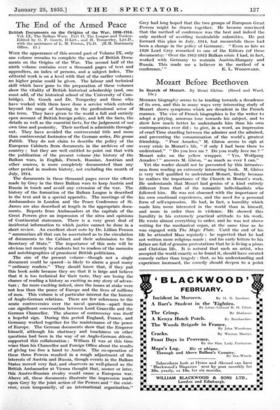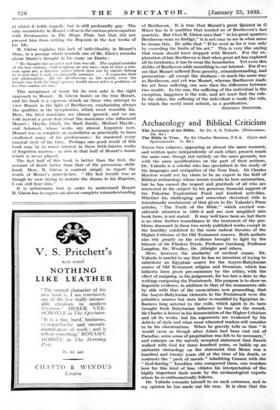Mozart Before Beethoven
In Search of Mozart. By Henri GlaSon. (Shoed and Ward. 15s.)
MonEaN biography seems to be tending towards a decadence of its own, and this in many ways very interesting study of Mozart shows symptoms which are decadent in the French manner. The vice of French biographies is for the writer to adopt a pitying, amorous tone towards his subject, and to show how much better he understands him than his own contemporaries ever did : to give, in a word, an impression of cruel Time standing between the admirer and the admired, and preventing the consummation of the world's greatest friendship. " Poor Amadeo," M. Gheon seems to sigh at every crisis in Mozart's life, " if only I had been- there to understand." " Do you love me ? Do you really love-me ? " Mozart asks on the yellow wrapper. " Yes, Wolfgang Amadeo " answers M. Gheon, " as much as ever I can."
Yet the reader should not be prevented by this intrusive- ness from reading an extremely interesting book. M. Gheon is very well qualified to understand Mozart, firstly because he realizes the importance of the Church in Mozart's work. He understands that Mozart had genius of a kind entirely different from that of the romantic individualists who followed him. He was not obsessed with the importance of his own emotional experiences, and the need for a personal form of self-expression. He had, in fact, a humility which made him more interested in the world than in himself, and more in order than in violence. He showed this humility in his extremely practical attitude to his work. He wrote almost everything to order, and he was not above writing for the mechanical organ, at the same time as he was engaged with The Magic Flute. Until the end of his life he attended Mass regularly : he regretted that he had not written more religious music ; and his early letters to his father are full of genuine protestations that he is living a pious and Christian life. It is natural that such an artist, who accepted the world exactly as he found it, should have created comedy rather than tragedy : that, as his understanding and experience increased, the comedy should deepen to a point at Which it holds tragedy, but• is -still profoundly gay. The only eccentricity in Mozart's ideas is the curious preoccupation with freemasonry in The Magic Flute,. but that did not prevent him from writing the Requiem in the last weeks of his life. .
M. Gheon explains this lack of individuality in Mozart's ideas, in a passage Which reminds one of Mr. Eliot's remarks about Dante's thought in his essay on Dante :
" He thought like an artist and that was all. The capital mistake of the last century—still weighing on our own—was to foist a mis. sion upon art, a directive power which does not by nature belong to it and that it only exeeptionally assumes . . . A musician does not philosophize. All the Beethoven in the world, even the unique one with his tragic genius, would never solve a problem, or for that matter set one."
This acceptance of music for its own sake is the right approach to Mozart. M. Ghion insists on the true Mozart, and his hook is a vigorous attack on those who attempt to view Mozart in the light of Beethoven, emphasizing always the qualities in the Symphonies, which most resemble his. Here, the later musicians are almost ignored, and we are told instead a great deal about the musicians who influenced Mozart ; Haydn, Gluck, the Bach family, Michael Haydn ; and Sehobert, whose works are almost forgotten now. Mozart was so complete an assimilator as practically to have swallowed many of his predecessors : he mastered every musical style of his time. Perhaps one good result of this book may be to renew interest in these little-known works of forgotten masters : as also in that half of Mozart's music which is never played. . .
The last half of this book is better than the first, the account of death better than that of the precocious child- hood. Here, M. Gheon is content simply to report the words of Mozart's sister-in-law. " His last breath was as though he were trying to imitate the drums in his Requiem, I can still hear him." It is unfortunate that in order to understand Mozart M. Gheon has to express an almost complete misunderstanding of Beethoven. It is true that Mozart's great Quintet- in G Minor has in it qualities that remind us of Beethoven's last quartets. But when M. Gheon says that " in his great quartets Beethoven went no further," it is not easy to see in what sense he means this. He adds that " If he went as far it was only by exceeding the limits of his att." This is very like saying that music should have stopped with Mozart. For the ex- planation of late Beethoven is that when great art has explored all its territories, it has to cross the boundaries. Yet even this dislike ofBeethoven adds something to our interest. For if we see that Mozart suffered from poverty, misunderstanding, and persecution—all except the deafness—in much the same way as Beethoven, and yet was Mozart, whereas Beethoven made his art from suffering, one sees then the difference between two worlds. In the one, the suffering of the individual is the exception, happiness is the rule, and art must find the rule. In the other, the suffering of the individual is made the rule, to which the world must submit, as a purification.
STEPHEN SPENDER.















































 Previous page
Previous page